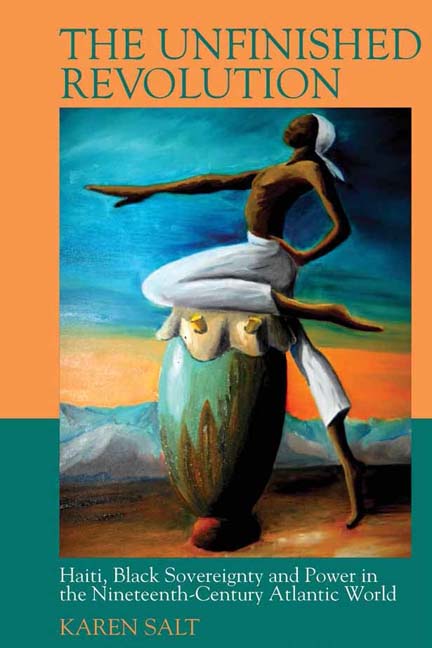 The Unfinished Revolution
The Unfinished Revolution Book contents
- Frontmatter
- Contents
- List of Figures
- Acknowledgements
- Introduction: Sovereignty and Power
- 1 Games of Sovereignty and Opportunity
- 2 Selling Citizenship, Recognising Blood, Stabilising Sovereignty
- 3 Burlesquing Empire: Performing Black Sovereignty on the World Stage
- 4 Welcome to the New World Order: Haiti and Black Sovereignty at the Turn of the Century
- 5 Sovereignty under Siege? Contemporary Performances of Black Sovereignty
- Bibliography
- Index
4 - Welcome to the New World Order: Haiti and Black Sovereignty at the Turn of the Century
- Frontmatter
- Contents
- List of Figures
- Acknowledgements
- Introduction: Sovereignty and Power
- 1 Games of Sovereignty and Opportunity
- 2 Selling Citizenship, Recognising Blood, Stabilising Sovereignty
- 3 Burlesquing Empire: Performing Black Sovereignty on the World Stage
- 4 Welcome to the New World Order: Haiti and Black Sovereignty at the Turn of the Century
- 5 Sovereignty under Siege? Contemporary Performances of Black Sovereignty
- Bibliography
- Index
Summary
Since the beginning of the eighteenth century, Blackness and race have constituted the (unacknowledged and often denied) foundation, what we might call the nuclear power plant, from which the modern project of knowledge—and of governance—has been deployed.
Achille MbembeIntroduction
Philosopher and political theorist Achille Mbembe, in writing about “practices of zoning” that trouble Blackness and beingness in the world, notes how “in some cases such practices are subtracted from all forms of national sovereignty,” existing within the lines of authority that populate extragovernmental entities. In other cases, these practices “remain under the control of foreign armies or of international organisations operating under the pretext of, or on behalf of, humanitarianism.” For Mbembe, these are forms of engagement linked to disorganisation, disaster and other forms of structural violence geared toward multiplying “states of exception nearly everywhere.”
This framing of black presents meets up with Mbembe's search for black futures in which he ponders how power will emerge from these moments in the black world. “Power comes to those who can dance with the shadows,” he argues, weaving “tight links between their own vital strength and other chains of power always situated in an elsewhere.” As if speaking about Haiti and its unfinished black sovereignty, Mbembe continues, noting that “power cannot be enclosed within the limits of a single, stable form,” mainly because all power—and specifically black power—“is power thanks only to its capacity for metamorphosis.” Haiti and its leaders have been engaged in this process of being, constraint, loss and metamorphosis since its revolutionary beginnings. In resisting disavowal and totalising nullification, Haiti maintains its “unfinishedness” by refusing destruction—even as it remains enchained to certain modes of interaction with international bodies that, contrary to their rhetoric, seem engaged in a process of “imperialism by disorganization.”
Throughout this book, I have argued for a way to grapple with the unfinished project of Haiti's black sovereignty. In earlier chapters, I discussed the ways that fungible transnational black labour set up a performance of black sovereignty that sought to accrete capital through racio-political kinship and black sweat. In presenting black sovereignty's mutations, I highlighted certain attempts by US newspapers and company representatives to (con)figure black sovereignty as a burlesque, while Haitian leaders (re)configured Haiti and its black sovereignty with imagery of power, generating a new currency that found an audience across the Atlantic Ocean in Britain.
- Type
- Chapter
- Information
- The Unfinished RevolutionHaiti, Black Sovereignty and Power in the Nineteenth-Century Atlantic World, pp. 153 - 190Publisher: Liverpool University PressPrint publication year: 2019


